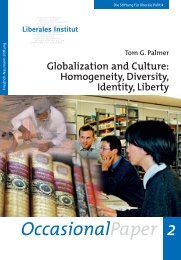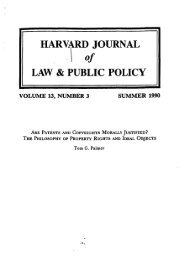G. A. Cohen on Self-Ownership, Property, and ... - Tom G. Palmer
G. A. Cohen on Self-Ownership, Property, and ... - Tom G. Palmer
G. A. Cohen on Self-Ownership, Property, and ... - Tom G. Palmer
You also want an ePaper? Increase the reach of your titles
YUMPU automatically turns print PDFs into web optimized ePapers that Google loves.
248 Critical Review Yo(. 12, No. 3example of acrophobia or acrophilia <strong>and</strong> the talent for tree climbing am<strong>on</strong>gcoc<strong>on</strong>ut harvesters; the preference for high places would generate an ec<strong>on</strong>omic“rent” (or profit) indistinguishable tiom the “rent” or profit generatedby a talent for climbing, <strong>and</strong> thus preferences <strong>and</strong> talents are difficult, if notimpossible, to distinguish.r3. The party who can make an “irrevocable comqitment” will be able to“squeeze the range of indeterminacy down to the point most favorable tohim“ (Schelling 1960,24).14. For a treatment of complementary strategies, see Sugden 1986.6749.IS. For an informed discussi<strong>on</strong> of the variety of l<strong>and</strong> regimes possible <strong>and</strong> c<strong>on</strong>sistentwith classical liberal views, see Bllicks<strong>on</strong> 1993.16. The issue is usefully canvassed in Buckle rg91, especially 36, 93, 104-5,16447, <strong>and</strong> 183-87. See also the careful discussi<strong>on</strong> of the issue in Pufendorf1994, especially 176-8s.17. Alan Ryan (1994) criticizes the noti<strong>on</strong> of “property in <strong>on</strong>e’s pers<strong>on</strong>,’’ but hedoes not c<strong>on</strong>sider the advantages to the c<strong>on</strong>cept of “property in” objects.C<strong>on</strong>temporary imprecise English usage identifies property <strong>and</strong> object; thus, I .might say that “this l<strong>and</strong> [watch, book, etcJ is my property? The older usageof speaking of having “a property in a thing” is far more precise <strong>and</strong> resectsthe complex multiplicity of property arrangements that are possible <strong>and</strong> thatare fully compatible with the libertarian defense of several property Thus, itmay be that each of many different pers<strong>on</strong>s has “a property” in a piece ofl<strong>and</strong>; <strong>on</strong>e has the right to live <strong>on</strong> it, another has the right to walk across it,yet another has the right to the rental income from it, <strong>and</strong> so <strong>on</strong>. As theRoman lawyers <strong>and</strong> the modern law-<strong>and</strong>-ec<strong>on</strong>omics scholars realize, “ownership”normally represents a bundle of such rights. Presenting the rights that<strong>on</strong>e has over <strong>on</strong>eself (not to be raped, not to be killed, not to be beaten, toexpress <strong>on</strong>e’s opini<strong>on</strong>s, to c<strong>on</strong>sent to <strong>on</strong>e’s marriage, <strong>and</strong> pthcr bourgeois indulgences)as property in <strong>on</strong>e’s pers<strong>on</strong> allows the legal system to rest <strong>on</strong> a coherent<strong>and</strong> integrated foundati<strong>on</strong>. The transiti<strong>on</strong> fiom the classical formulati<strong>on</strong>(“pers<strong>on</strong> X has a propercy in object Y”) to the modern <strong>and</strong> less preciseformulati<strong>on</strong> (“object Y is X’s property”) has made legal discussi<strong>on</strong> less clear<strong>and</strong> has led-in the attempt to focus attenti<strong>on</strong> <strong>on</strong> the right rather than theobject-to the formati<strong>on</strong> of such c<strong>on</strong>cepts as “property rights,’’ which means“right rights.”James Madir<strong>on</strong> (1983,266) made a valiant attempt to retain theprecisi<strong>on</strong> of the classical formulati<strong>on</strong>, <strong>and</strong> to relate the righo to keedom ofspeech <strong>and</strong> religi<strong>on</strong> to the rights to domini<strong>on</strong> over l<strong>and</strong> <strong>and</strong> other objects, inhis essay “<strong>Property</strong>”:This term in its particulat applicati<strong>on</strong> means ‘that domini<strong>on</strong> which <strong>on</strong>eman claims <strong>and</strong> exercises over the external things of the world, in exclusi<strong>on</strong>of every other individual.’ In its larger <strong>and</strong> juster meaning, itembraces every thing to which a man may attach a value <strong>and</strong> have aright; <strong>and</strong> which leaves to euey <strong>on</strong>e else the like adwntage. In the formersense, a man’s l<strong>and</strong>, or merch<strong>and</strong>ise, or m<strong>on</strong>ey is called his property Inthe latrer sense, a man has a property in his opini<strong>on</strong>s <strong>and</strong> the free com-











